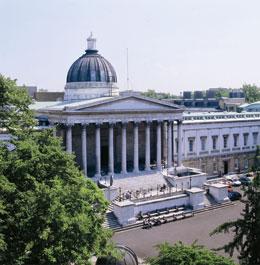Thursday, August 28, 2008
Wilder Penfield
Wednesday, August 27, 2008
Sharing is Caring
A compassionate reminder ...
And more about energy advancement ...
Monday, August 25, 2008
Systems Biology
Sunday, August 24, 2008
Harvey Cushing performs 2000th tumor removal
Friday, August 22, 2008
"University College London will play host to £140-million institute"
 UCL: the nerve centre of neuroscience
UCL: the nerve centre of neuroscienceObviously, the hottest topic in neuroscience is understanding how the complex networks of proteins making up the synapse relates to the functions of individual systems on through to whole brain interactions governing behavior.
UCL, already a leader in the world of neuroscience is now searching to bring together the best of the established and upcoming science world. This collaborative effort hopes to leapfrog neuroscience from its present state of basic knowledge into a field full of practical applications.
This trend to make neuroscience applied, so to speak, has been termed "translational".
This movement hopes to create a new breed of scientists who "bridges the gap from bench to bedside". Although, the efforts of this movement have yet to been felt the mere fact it exists bid well for future therapies.
Thanks to Noah
Link to Nature article
First Wi-fi, now wireless power
Intel on Thursday showed off a wireless electric power system that analysts say could revolutionize modern life by freeing devices from transformers and wall outlets. ...
Electricity was sent wirelessly to a lamp on stage, lighting a 60 watt bulb that uses more power than a typical laptop computer.
Most importantly, the electricity was transmitted without zapping anything or anyone that got between the sending and receiving units.
"The trick with wireless power is not can you do it; it's can you do it safely and efficiently," Intel researcher Josh Smith said in an online video explaining the breakthrough.
"It turns out the human body is not affected by magnetic fields; it is affected by elective fields. So what we are doing is transmitting energy using the magnetic field not the electric field."
However, this last line concerns me a little, "the human body is not affected by magnetic fields." This is not true. If this were the case, our fancy imaging machines (MRI stands for magnetic resonance imaging) would be of little use. It may be that magnetic fields have not detrimental affect on the human body, but we never generated tons of man-made magnetic fields and sent it traveling amongst our city. This technology appears fantastic but like ever new venture we make into life altering technology our excitement needs to be tamed by caution.
Thursday, August 21, 2008
Incessant chatter of the Mind
William James on consciousness and memory:
The stream of thought flows on; but most of its segments fall into the bottomless abyss of oblivion. Of some, no memory survives the instant of their passage. Of others, it is confined to a few moments, hours or days. Others, again, leave vestiges which are indestructible, and by means of which they may be recalled as long as life endures.
A few articulate words from one of America's (and NY's own) first psychologists about how most of our conscious mental experience is fleeting and inconsequential.
James was a prominent in developing many important psychological principals, for instance pragmatism. As well, James, along with is contemporary Carl Lange, developed the perspective that emotions are minds interpretation of physiological conditions arising from external stimulus. The famous example is that you see a bear, sweat, run and then become afraid.
James also made important contributions to philosophy of religion, and was actively involved in exploring mystical experiences
via Mo
Wednesday, August 6, 2008
Greetings!
Since I am rather new to the art of blogging it may be a while before my first in depth article appears, but please keep checking back from time to time.
My first piece will concern itself with, aptly I think, whether the brain is actually both plastic, and elastic. In other words, is it the case that the brain undergoes only permanent changes (plastic) or is this more of a special case and more often than the not the brain undergoes a change temporarily only to revert back to its original form (elastic) if the change was unnecessary.
While I work on that, may I suggest a few of my favorite Neuroblogs for your enjoyment:
Neurophilosphy - Mo's post are always very succinct, informative, and up-to-date. His posts range the gamut from the synapse, fMRI, to interviews and blogging about current conferences.
He does not know it, but his blog was my first introduction to neuroblogging and I am indebted to him for spurning my interest.
The Frontal Cortex - Jonah Lehrer - a fantastic writer, is editor-at large of Seed Magazine.
The Neurocritic - always providing edgy critques for the cynic in all of us.
Neuronism - another upstart neuroblog. I am not too familair with it, but I dig Cian's most recent post on dendritic plasticity


